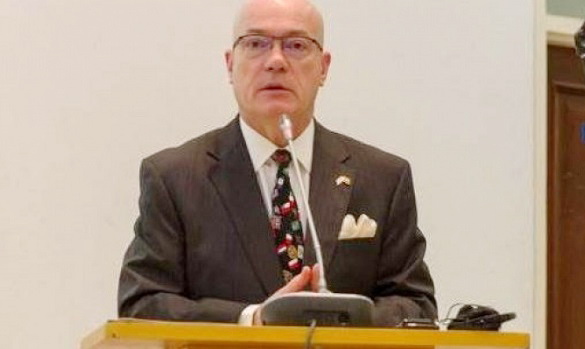
Arson at medical stores setback US support to health sector
The United States Ambassador, Mr Robert P. Jackson, has said that the fire that gutted the Tema Central Medical Stores in 2015, which appeared to have “been ignited to cover up corruption, has dealt a blow to our ability to support public health in Ghana.”
Advertisement
He said Ghanaians were still waiting for justice in relation to the issue that resulted in the destruction of more than $80 million worth of medical supplies and drugs, including $7 million in donations from the American people.
Mr Jackson was speaking as a special guest of honour at the launch of a survey report, titled, “Corruption is Eating us up: A Call to Action,” in Accra yesterday.
The survey was undertaken by the consortium of three civil society organisations working to implement a four-year project called, “Accountable Democratic Institutions and Systems Strengthening (ADISS) in 50 districts across the country.
The consortium is made up of the Ghana Integrity Initiative (GII), the Ghana Anti-Corruption Coalition (GACC) and SEND-Ghana. The United States Agency for International Development (USAID) is funding the project.
Corruption is ubiquitous
Mr Jackson said the survey contained troubling findings about the scope of corruption, showing that Ghanaians felt corruption was ubiquitous and impacted the integrity of public institutions.
“This pervasive corruption directly impacts some of the areas that are most critical to Ghana’s growth and development,” he said.
“Corruption kills and robs. When a medical practitioner fails to appear at the government clinic to be at the private clinic, those dependent on the government clinic suffer. When a teacher demands sexual favours to award better grade, he is committing a crime. When one has to wait weeks for a passport or a driving licence, one’s income can be affected. These are all forms of corruption or mismanagement or both,” he added.
While applauding the commitment of the government in fighting the canker, Mr Jackson said the United States was working with ministries, local government bodies and others to strengthen systems to increase transparency.
Corruption cancer
The chairperson for the launch, Mr Joe Winful, said “Corruption is like cancer. It is eating us all up and we do not know when it is going to end.”
Mr Winful, who is also the Chairperson of the Public Interest and Accountability Committee (PIAC), charged participants to be innovative and practical in their ways of fighting corruption.
He charged all to share their anti-corruption innovations to purge the canker from the Ghanaian society.
Expectation
The Chief of Party of ADISS and Executive Director of the GII, Mrs Linda Ofori Kwafo, explained that the next leg of the project was to use such surveys as evidence in advocacy against corruption.
She said the survey and the recent Corruption Perception Index showed that the country was not doing too well.
“We are in high expectation of the fulfilment of the promises of the government in the fight against corruption,” Mrs Ofori-Kwafo said.
Highlights
Presenting highlights of the survey report, the Country Director of SEND-Ghana, Mr George Osei-Bimpeh, said while about 90 per cent of respondents surveyed associated bribery with corruption, fewer respondents had an appreciation of the forms of corruption.
Thus, nepotism for instance was not associated with corruption except by respondents with a high level of education.
On conflict of interest, the results also showed that respondents with a higher level of education associated the vice with corruption, while those with a lower level of education did not think it was a corrupt act.
Most respondents, also did not think that the payment of facilitation fees was a bribe.
Independent institutions of state with anti-corruption functions were also not trusted to fight corruption, with the police, political parties and the judiciary ranking as institutions perceived as extremely corrupt.
Institutions most trusted in the fight against corruption were the Central Government, the media and NGOs, with the Commission on Human Rights and Administrative Justice placing fourth.
Writer's email: [email protected]




